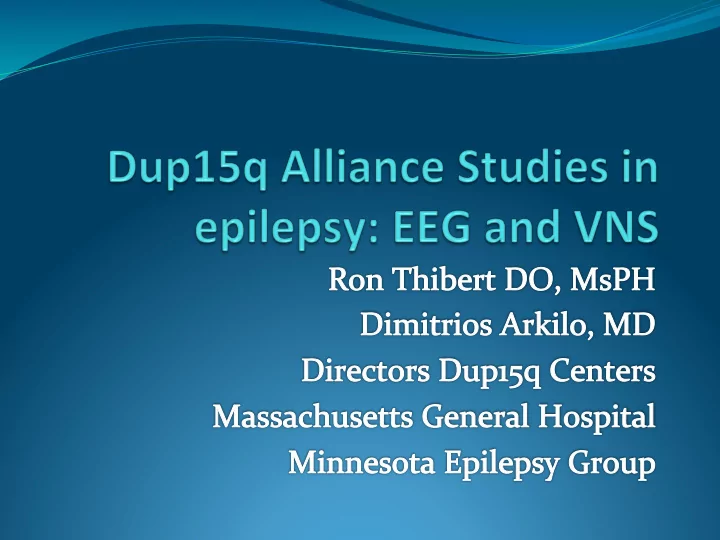

EEG ¡study ¡ As ¡part ¡of ¡the ¡initial ¡MGH ¡clinic ¡data ¡collection ¡in ¡ 2012, ¡unique ¡electroencephalographic ¡patterns ¡during ¡ sleep ¡in ¡children ¡with ¡chromosome ¡15q11.2-‑13.1 ¡ duplications ¡(Dup15q) ¡were ¡noted. ¡ Objective: ¡Determine ¡signature ¡patterns ¡in ¡children ¡ with ¡Dup15q ¡
EEG ¡study ¡ Methods: ¡Retrospective ¡review ¡of ¡inpatient ¡overnight ¡ video-‑EEG ¡recordings ¡ ¡ Centers: ¡MGH, ¡Minnesota, ¡NYU ¡ EEG ¡reading: ¡Scored ¡manually ¡by ¡board ¡certified ¡ epileptologists ¡and ¡sleep ¡medicine ¡specialists ¡
EEG ¡study ¡ Results: ¡34 ¡children ¡ ¡ 19 ¡boys ¡and ¡14 ¡girls ¡ ¡ Mean ¡age ¡8.1 ¡years ¡ ¡ 24 ¡with ¡idic15 ¡and ¡10 ¡with ¡int ¡dup15 ¡ Interstitial: ¡ 3/10 ¡had ¡seizures ¡– ¡all ¡well ¡controlled ¡on ¡1 ¡AED ¡ Seizures ¡were ¡focal ¡(2) ¡or ¡absence ¡(1) ¡ Isodicentric: ¡ 23/24 ¡with ¡seizures ¡
EEG ¡Findings ¡– ¡Int ¡dup15 ¡ 10 ¡children ¡with ¡int ¡dup15 ¡ None ¡had ¡alpha ¡delta ¡sleep ¡ None ¡had ¡high-‑amplitude/high ¡voltage ¡spikes ¡ 1 ¡had ¡possible ¡CSWS ¡but ¡no ¡seizures ¡
EEG ¡study ¡– ¡idic15 ¡ ¡ 3 ¡patterns ¡seen: ¡ Alpha ¡delta ¡sleep ¡ Continuous ¡spike ¡and ¡waves ¡in ¡sleep ¡ High-‑amplitude, ¡high-‑frequency ¡spikes ¡
EEG ¡study ¡– ¡alpha ¡delta ¡sleep ¡ 1 st : ¡Alpha ¡delta ¡sleep, ¡6/12 ¡children ¡with ¡idic15 ¡ (Minnesota ¡data ¡only) ¡ Alpha-‑delta ¡sleep ¡in ¡non ¡rapid ¡REM ¡sleep ¡was ¡defined ¡ as ¡the ¡appearance ¡of ¡prominent ¡alpha ¡activity ¡ (frequency ¡of ¡8-‑13 ¡Hertz) ¡on ¡delta ¡waves ¡(frequency ¡of ¡ 0.5-‑2 ¡Hertz). ¡ ¡
EEG ¡study ¡– ¡CSWS ¡ ¡ 2 nd ¡pattern: ¡CSWS, ¡20/24 ¡children ¡ Defined ¡as ¡continuous ¡unilateral ¡or ¡bilateral ¡ epileptiform ¡activity ¡that ¡occupied ¡more ¡than ¡50% ¡of ¡ slow ¡wave ¡sleep ¡ 18/20 ¡children ¡with ¡CSWS ¡have ¡clinical ¡seizures ¡
CSWS ¡
EEG ¡study ¡ 3 rd ¡pattern: ¡18/24 ¡children ¡had ¡frequent ¡bursts ¡of ¡high ¡ amplitude ¡and ¡fast ¡frequency ¡activity ¡ ¡(12-‑15 ¡Hz ¡and ¡ up ¡to ¡300+ ¡uV). ¡ ¡ Noted ¡during ¡non-‑REM ¡sleep ¡ Associated ¡mainly ¡with ¡tonic ¡seizures ¡and/or ¡spasms ¡
High-‑amplitude, ¡high ¡frequency ¡
High-‑amplitude, ¡high ¡frequency ¡
Diffuse ¡beta ¡acDvity ¡in ¡Dup15q ¡ !
EEG ¡study ¡-‑ ¡Conclusions ¡ Significance: ¡1 st ¡report ¡of ¡these ¡findings ¡ CSWS: ¡Associated ¡with ¡developmental ¡regression ¡and ¡ autistic ¡features ¡ Alpha ¡Delta: ¡Seen ¡in ¡dysautonomia ¡– ¡consider ¡ relation ¡with ¡SUDEP? ¡ High ¡amplitude ¡fast ¡frequency: ¡Unclear, ¡but ¡likely ¡ unique ¡signature ¡rhythm ¡and ¡likely ¡epileptiform ¡– ¡ possible ¡relation ¡to ¡abnormal ¡GABA ¡transmission ¡ given ¡higher ¡frequency? ¡ ¡
VNS ¡study ¡ Efficacy ¡and ¡safety ¡of ¡Vagus ¡Nerve ¡Stimulator ¡in ¡ individuals ¡with ¡chromosome ¡15q ¡duplication ¡and ¡ refractory ¡epilepsy ¡ Objective: ¡Determine ¡efficacy ¡of ¡VNS ¡in ¡children ¡with ¡ Dup15q ¡
VNS ¡study ¡ Methods: ¡Electronic ¡survey ¡was ¡sent ¡through ¡the ¡ Alliance ¡ Questions ¡regarding ¡demographics, ¡seizure ¡control ¡ and ¡anticonvulsant ¡medication ¡use ¡prior ¡to ¡and ¡after ¡ VNS ¡placement ¡in ¡a ¡2 ¡year ¡time ¡frame ¡
VNS ¡study ¡ Results: ¡17 ¡patients ¡responded ¡(10 ¡females) ¡ Mean ¡age ¡19 ¡years ¡(range ¡7-‑39 ¡years) ¡ 11 ¡with ¡IDIC15 ¡(68%) ¡and ¡6 ¡(32%) ¡with ¡interstitial ¡or ¡ edge ¡duplications ¡ Age ¡of ¡seizure ¡(sz) ¡onset: ¡4 ¡months ¡to ¡13 ¡years, ¡mean ¡ age ¡6 ¡years. ¡ 11/17 ¡have ¡generalized ¡sz, ¡4 ¡with ¡generalized ¡and ¡focal ¡ sz ¡and ¡2 ¡with ¡focal ¡sz ¡ 15 ¡patients ¡with ¡Lennox-‑Gastaut ¡Syndrome ¡
VNS ¡study ¡ Prior ¡to ¡VNS ¡placement: ¡ ¡ Mean ¡of ¡3 ¡AEDs ¡(range ¡1-‑5) ¡ 3 ¡children ¡with ¡<1 ¡sz ¡daily ¡ 5 ¡children ¡with ¡2-‑10 ¡sz ¡daily ¡ 9 ¡children ¡with ¡>10 ¡sz ¡daily ¡ 4/17 ¡have ¡history ¡of ¡status ¡epilepticus, ¡3/17 ¡using ¡ rescue ¡antiepileptic ¡medication ¡>twice ¡per ¡month ¡
VNS ¡study ¡ After ¡the ¡VNS ¡placement: ¡ ¡ Mean ¡2.8 ¡AEDs ¡(range ¡1-‑5) ¡ 9/17 ¡children ¡with ¡>50% ¡sz ¡reduction ¡ 8/17 ¡children ¡with ¡<50% ¡sz ¡reduction ¡ 1/17 ¡had ¡status ¡epilepticus ¡ 1/17 ¡was ¡using ¡rescue ¡medication ¡>twice ¡per ¡month ¡ 11/17 ¡used ¡the ¡magnet, ¡7 ¡of ¡which ¡reported ¡dramatic ¡ reduction ¡to ¡sz ¡duration ¡
VNS ¡study ¡ Complications: ¡ 2/17 ¡patients, ¡1 ¡with ¡site ¡infection ¡and ¡1 ¡with ¡ dysphagia ¡that ¡resolved ¡with ¡change ¡in ¡parameter ¡ settings ¡
VNS ¡study ¡ Parental ¡report ¡of ¡benefit: ¡ Scale ¡1-‑10, ¡1 ¡no ¡benefit-‑10 ¡most ¡effective ¡treatment ¡ 9/17 ¡scored ¡higher ¡than ¡5 ¡ 5/17 ¡scored ¡higher ¡than ¡7 ¡ Only ¡3/17 ¡reported ¡on ¡benefit ¡ At ¡least ¡8 ¡patients ¡opted ¡to ¡replace ¡the ¡generator ¡ battery ¡
VNS ¡study ¡ Significance: ¡1 st ¡report ¡ Well ¡tolerated ¡ Promising ¡results ¡for ¡a ¡very ¡refractory ¡cohort ¡ Excellent ¡results ¡for ¡status ¡epilepticus ¡and ¡use ¡of ¡ rescue ¡medication ¡ New ¡device ¡available ¡with ¡detection ¡of ¡heart ¡rate ¡and ¡ intervention-‑need ¡to ¡explore ¡that ¡option ¡for ¡our ¡ patients ¡
Recommend
More recommend